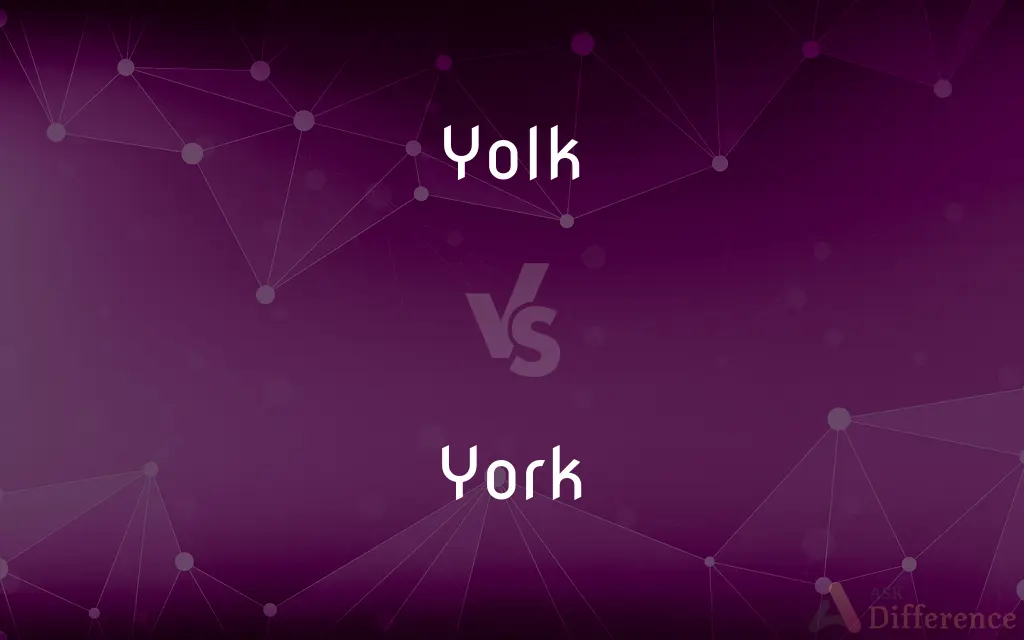Yolk vs. York — What's the Difference?
Edited by Tayyaba Rehman — By Urooj Arif — Updated on April 1, 2024
Yolk refers to the nutrient-rich inner part of an egg, while York is a historic city in England, known for its rich heritage and architecture.

Difference Between Yolk and York
Table of Contents
ADVERTISEMENT
Key Differences
Yolk is the yellow part of an egg, providing essential nutrients and energy for the embryo's development in fertilized eggs. It is high in vitamins, minerals, and fats, making it a valuable food source. York, on the other hand, is a city with a deep historical background, from its Roman roots to its Viking past, and is famous for landmarks like York Minster and its well-preserved medieval city walls.
While the yolk is central to discussions about nutrition and culinary uses, York is often associated with tourism, history, and cultural heritage. The yolk's primary significance lies in its role within an egg and its nutritional value to both the developing embryo and humans. In contrast, York's importance stems from its historical contributions, architectural marvels, and cultural significance in the UK.
The terminology around yolk is specific to biology and the culinary world, focusing on its composition, benefits, and uses in cooking. York's discourse, however, spans history, architecture, and urban development, reflecting its status as a center of cultural and historical interest.
In terms of context, yolk is relevant in discussions about food, nutrition, and biology. York is relevant in conversations about British history, tourism, and architectural conservation. Their only commonality might be their significance in their respective fields—yolk in the biological and culinary worlds, and York in historical and cultural contexts.
Comparison Chart
Definition
The nutrient-rich inner part of an egg.
A historic city in England.
ADVERTISEMENT
Significance
Nutritional value and energy source.
Historical, cultural heritage.
Associated Terms
Biology, nutrition, cooking.
History, architecture, tourism.
Primary Context
Food, culinary arts.
British history, cultural studies.
Key Features
High in vitamins, minerals, fats.
Notable landmarks like York Minster.
Compare with Definitions
Yolk
Essential for baking and sauces.
The recipe required one egg yolk to enrich the sauce.
York
A city in England known for its rich history and architecture.
They planned a trip to York to explore its medieval streets.
Yolk
Considered a dense source of nutrition.
Bodybuilders consume egg yolks for protein and fats.
York
Known for well-preserved medieval city walls.
Walking along York's city walls provides views of its historic core.
Yolk
Nourishes the developing embryo in fertilized eggs.
The yolk provides all necessary nutrients for the embryo's growth.
York
Features a deep historical background.
York's Viking heritage is showcased at the Jorvik Viking Centre.
Yolk
The yellow inner part of an egg, rich in nutrients.
She separated the yolk from the white to make meringue.
York
Attracts visitors for its landmarks and history.
Tourists visit York Minster, one of the largest cathedrals in Northern Europe.
Yolk
Source of vitamins, minerals, and fats.
The dietitian emphasized the yolk's high vitamin D content.
York
A center of British cultural and historical interest.
The York Museum Gardens offer a glimpse into the city's Roman past.
Yolk
Among animals which produce eggs, the yolk (; also known as the vitellus) is the nutrient-bearing portion of the egg whose primary function is to supply food for the development of the embryo. Some types of egg contain no yolk, for example because they are laid in situations where the food supply is sufficient (such as in the body of the host of a parasitoid) or because the embryo develops in the parent's body, which supplies the food, usually through a placenta.
York
York is a cathedral city and unitary authority area, at the confluence of the rivers Ouse and Foss, in England. The city has long-standing buildings and structures, such as a minster, castle and ancient city walls.
Yolk
The yellow internal part of a bird's egg, which is surrounded by the white, is rich in protein and fat, and nourishes the developing embryo
Two yolks
A mass of yolk
York
(cricket) to bowl a yorker at a batsman, especially to get a batsman out in this way.
Yolk
The portion of the egg of egg-laying vertebrates, such as reptiles and birds, and of certain invertebrates that consists chiefly of protein and fat and serves as the primary source of nourishment for the early embryo.
York
(slang) To vomit.
Yolk
This portion of the egg of a bird, especially a chicken, which is large, yellow, and surrounded by albumen.
York
The English royal house (a branch of the Plantagenet line) that reigned from 1461 to 1485; its emblem was a white rose
Yolk
A greasy substance found in unprocessed sheep's wool, which is refined to make lanolin.
Yolk
The yellow, spherical part of an egg that is surrounded by the white albumen, and serves as nutriment for the growing young.
To make meringue, you have to separate the white from the yolk.
Egg white
Yolk
The grease in a sheep's fleece; lanolin.
Yolk
The yellow part of an egg; the vitellus.
Yolk
An oily secretion which naturally covers the wool of sheep.
Yolk
Nutritive material of an ovum stored for the nutrition of an embryo (especially the yellow mass of a bird or reptile egg)
Common Curiosities
What makes egg yolk nutritious?
Egg yolk is nutritious due to its high content of vitamins, minerals, proteins, and healthy fats.
Can you visit historical sites in York?
Yes, York is home to numerous historical sites, including York Minster, the Shambles, and the city walls.
Are egg yolks healthy?
Egg yolks are considered healthy when consumed in moderation, offering essential nutrients but also high in cholesterol.
What is York famous for?
York is famous for its rich history, including Roman and Viking heritage, medieval architecture, and cultural landmarks.
What historical periods are reflected in York?
York reflects several historical periods, including Roman, Viking, medieval, and Victorian eras.
Is it better to use whole eggs or just yolks in baking?
It depends on the recipe; whole eggs provide structure and leavening, while yolks add richness and tenderness to baked goods.
Is the yolk essential for egg-based dishes?
Yes, the yolk is essential for many egg-based dishes, contributing to their flavor, texture, and nutritional value.
How is the yolk used in cooking?
Yolk is used in cooking for emulsifying sauces, enriching baked goods, and as a key ingredient in custards and creams.
What can tourists do in York?
Tourists in York can explore historical landmarks, enjoy its cultural festivals, visit museums, and walk along the ancient city walls.
Why is York considered an important historical city?
York is considered important due to its extensive and well-preserved historical heritage, offering insights into England's past.
Share Your Discovery

Previous Comparison
Message vs. Idea
Next Comparison
Inadequate vs. IneffectiveAuthor Spotlight
Written by
Urooj ArifUrooj is a skilled content writer at Ask Difference, known for her exceptional ability to simplify complex topics into engaging and informative content. With a passion for research and a flair for clear, concise writing, she consistently delivers articles that resonate with our diverse audience.
Edited by
Tayyaba RehmanTayyaba Rehman is a distinguished writer, currently serving as a primary contributor to askdifference.com. As a researcher in semantics and etymology, Tayyaba's passion for the complexity of languages and their distinctions has found a perfect home on the platform. Tayyaba delves into the intricacies of language, distinguishing between commonly confused words and phrases, thereby providing clarity for readers worldwide.













































